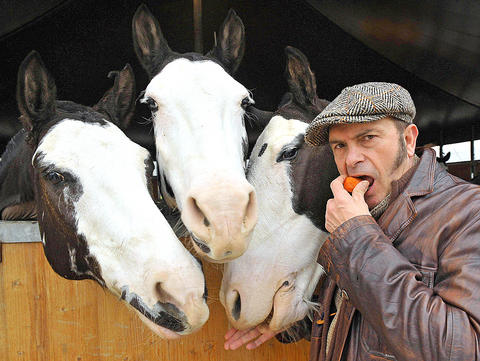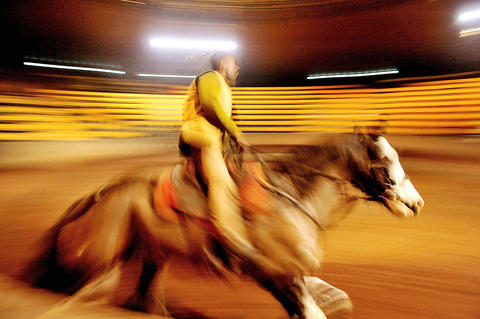Bartabas, enigmatic visionary behind one of the world's most spectacular circuses, says his latest equestrian extravaganza is a celebration of life that transcends nationality, religion and race.
The show - in which 36 horses and their riders gallop around an arena for 90 minutes of fast-paced, acrobatic and comic story-telling - is a showcase, he says, for his philosophy of tolerance.
The theme is in the show's name: Battuta - a term he created from a combination of words cherry-picked from his native French, Romanian and Romany which he says aims to convey the energy and beauty of Gypsy music.

PHOTO: AFP
"I went to Romania and I was very surprised to see how these people (Gypsies) are treated," said Bartabas, who is known only by his stage name.
"In Europe they are outsiders, even though more than 20 years ago, people in Europe were talking about open borders. But we don't accept that people live differently, because their values are different."
Sitting in the stalls of the four-pointed tent erected on the northern shore of Hong Kong harbor in which the show takes place, Bartabas said this latest production by his company Zingaro - Gypsy in Italian - continues a tradition of drawing inspiration from a variety of cultures and lifestyles.

PHOTO: AFP
"It is a very important idea for Zingaro, to be able to live with people of all religions, nationalities and philosophies," he said.
"They come and live with us," he says of Zingaro's performers and musicians who hail from across Europe.
"We live always in the theater - not because we are a family of gypsies, but because we need to live with the horses and live together. The idea is that we have to learn from one another."
Bartabas is regarded in Europe as an almost mythical figure because he insists on using his stage name only, and stories abound of his origins stretching from Romania to Rajasthan.
A day in the life of a gypsy family
But as he watches riders exercise two of the 38 horses who arrived in Hong Kong aboard two Boeing 747 jets, he says there is no mystery about him.
"I come from outside Paris, my father was an architect, I did not grow up riding, but I was always fascinated by horses and I followed many disciplines - racing, dressage, bullfighting, jumping - before I came to this."
From his base near Versailles, Bartabas has built an equestrian academy, with support from the French government, where he trains horses and riders and creates his narrative spectacles.
The current show, which has been thrilling Hong Kong audiences since early last month, took three years to perfect, he says.
It portrays a day in the life of a Gypsy community, beginning with the breaking of camp at dawn through a rambunctious series of events from women fighting over stolen washing, to a young bride eloping with her lover, being chased and brought home by her irate father and brothers - all on horseback.
Two Gypsy orchestras - a brass ensemble from Moldova and fiddlers from Transylvania - provide a jolly, pace-setting soundtrack to the breathtaking acrobatics.
Riders perform somersaults, headstands and stripteases on horseback; they dance, ride two horses at once and swap mounts mid-stride; one rider makes her horse skip in double-time; another leaps on and off a cantering draft horse.
A gang of youths show off to each other by throwing their hats on the ground and picking them up again, all the while maintaining a frenetic gallop, standing in their saddles, beating their chests and shouting at each other like young men hanging out on street corners the world over.
The pace never wanes - and Bartabas described Battuta as the most ambitious show he has produced since Zingaro was established in 1984.
"Now I'm working a lot on the energy and physical impact," he said. "It is not an intellectual show - it gets your heart first, and then your head. I have no text, there's no reason for me to use language."
"I don't make the performance to show the horses - I want to show the reaction and relationship between man and horse. The way you are with the horse is the way you are with others," he added.
"The horse gives you back what you give - like a Stradivarius," he said, referring to the rare violins made by the Italian Stradivari family in the late 17th and early 18th centuries.
"If you teach him the language of love and sensuality and sensibility, you will get it back."
Spectacular acrobatics
The logistics of Battuta are head-spinning - the 38 horses, which include two standbys in case any are injured during training or performing, eat about 17kg of food each a day, or a daily total of around 640kg.
They follow a strict diet of straw and mixed cereals served at intervals, including a supper of hay after the show. They snack on a total of 25kg of carrots a day and bed down on wood shavings that over the course of their two months in Hong Kong will amount to 23,200kg.
They are exercised for at least an hour each day to make sure they stay in peak fitness for the furious pace of the show, are put to bed at 10pm each night and woken with breakfast at 7am.
Each horse performs for a total of about 15 minutes, appearing several times during the show - running free, performing acrobatics and pulling carts.
The show runs in Hong Kong until March 23. Bartabas said he plans to take Battuta to Moscow, Tokyo, Sao Paulo and Brussels.

In recent weeks the Trump Administration has been demanding that Taiwan transfer half of its chip manufacturing to the US. In an interview with NewsNation, US Secretary of Commerce Howard Lutnick said that the US would need 50 percent of domestic chip production to protect Taiwan. He stated, discussing Taiwan’s chip production: “My argument to them was, well, if you have 95 percent, how am I gonna get it to protect you? You’re going to put it on a plane? You’re going to put it on a boat?” The stench of the Trump Administration’s mafia-style notions of “protection” was strong

Every now and then, it’s nice to just point somewhere on a map and head out with no plan. In Taiwan, where convenience reigns, food options are plentiful and people are generally friendly and helpful, this type of trip is that much easier to pull off. One day last November, a spur-of-the-moment day hike in the hills of Chiayi County turned into a surprisingly memorable experience that impressed on me once again how fortunate we all are to call this island home. The scenery I walked through that day — a mix of forest and farms reaching up into the clouds

With one week left until election day, the drama is high in the race for the Chinese Nationalist Party (KMT) chair. The race is still potentially wide open between the three frontrunners. The most accurate poll is done by Apollo Survey & Research Co (艾普羅民調公司), which was conducted a week and a half ago with two-thirds of the respondents party members, who are the only ones eligible to vote. For details on the candidates, check the Oct. 4 edition of this column, “A look at the KMT chair candidates” on page 12. The popular frontrunner was 56-year-old Cheng Li-wun (鄭麗文)

“How China Threatens to Force Taiwan Into a Total Blackout” screamed a Wall Street Journal (WSJ) headline last week, yet another of the endless clickbait examples of the energy threat via blockade that doesn’t exist. Since the headline is recycled, I will recycle the rebuttal: once industrial power demand collapses (there’s a blockade so trade is gone, remember?) “a handful of shops and factories could run for months on coal and renewables, as Ko Yun-ling (柯昀伶) and Chao Chia-wei (趙家緯) pointed out in a piece at Taiwan Insight earlier this year.” Sadly, the existence of these facts will not stop the